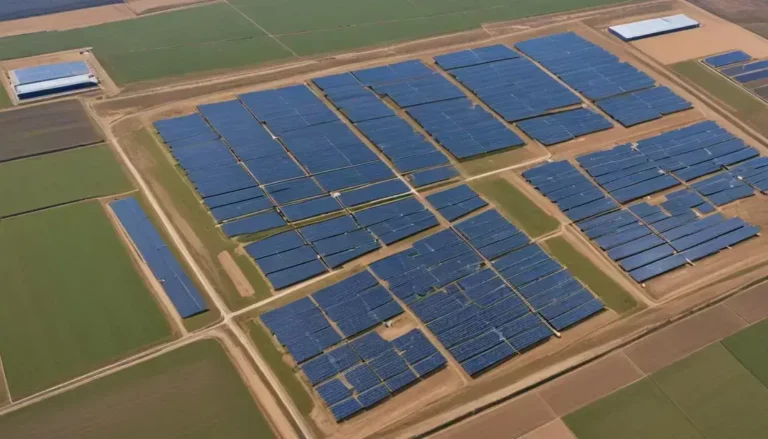bp’s Strategic Shift: A New Sustainability Approach
bp is committed to achieving net zero operations by 2050 through significant investments in renewable energy and sustainable practices, aiming to reduce carbon emissions and enhance biodiversity.
In this article, we explore bp’s revised approach to sustainability, focusing on their commitment to sustainability amidst challenging market conditions.
Introduction to bp’s sustainability strategy
bp’s sustainability strategy marks a pivotal shift in how the company approaches its role in the energy sector. By emphasizing net zero operations, bp aims to significantly reduce its carbon footprint and contribute to global efforts against climate change. This transition aligns with a growing demand for cleaner energy solutions, propelling the company to explore innovative technologies.
A key aspect of bp’s strategy involves increasing investments in renewable energy sources. The company plans to allocate substantial resources toward wind and solar projects, demonstrating its commitment to a sustainable future. Furthermore, this focus on renewable energy is not merely a trend; it represents a deep-rooted transformation in bp’s overall business model.
The importance of community support is another cornerstone of bp’s sustainability vision. By engaging local communities and stakeholders, the company aims to foster partnerships that enhance social and environmental well-being. This multi-faceted approach ensures that sustainability efforts extend beyond mere compliance and genuinely contribute to the betterment of society.
Ultimately, bp’s sustainability strategy is not just about reducing emissions; it’s about rethinking how a major energy player can integrate sustainability into its core operations. The implications of this strategy could reshape the future of the energy landscape, making way for a greener tomorrow.
Key components of the new approach
bp’s new sustainability approach is rooted in several key components that aim to drive transformational change within the company and the industry at large. Central to this strategy is the commitment to achieving net zero emissions by 2050. This ambitious goal not only addresses climate change but also positions bp as a leader in the transition toward a low-carbon future.
Another critical element is the investment in renewable energy sources. bp plans to significantly increase its portfolio in solar, wind, and other sustainable technologies. This shift reflects a strategic pivot from traditional fossil fuels to cleaner energy solutions, ensuring long-term viability in a rapidly changing market.
Moreover, bp places a strong emphasis on sustainable partnerships. By collaborating with governments, NGOs, and communities, the company seeks to foster inclusive growth and environmental stewardship. These partnerships are crucial for developing effective strategies that align with local and global sustainability goals.
Finally, the commitment to transparency in reporting is a vital aspect of bp’s new approach. By publicly sharing data and progress on sustainability initiatives, the company aims to build trust and accountability with stakeholders, reinforcing its dedication to responsible corporate governance.
Impact of fossil fuel investments
Investments in fossil fuels have far-reaching implications for both the environment and the energy sector. These investments are often controversial due to their impact on climate change and global warming. While fossil fuels have historically fueled economic growth, their environmental costs are becoming increasingly unsustainable.
One significant impact of fossil fuel investments is the contribution to greenhouse gas emissions. These emissions are major drivers of climate change, leading to severe weather events and habitat destruction. As climate awareness grows, companies face mounting pressure to reassess their allocations toward fossil fuel assets and shift towards more sustainable energy solutions.
Additionally, there are financial risks associated with continued fossil fuel investments. With many nations committing to net-zero goals, investments in fossil fuels may become stranded assets. Investors are now considering environmental, social, and governance (ESG) factors when making decisions, signaling a shift towards sustainability-focused portfolios.
Moreover, fossil fuel investments can create social challenges, particularly in communities dependent on these industries for jobs. Transitioning away from fossil fuels necessitates strategic planning to ensure that affected workers and communities receive support. By investing in renewable energy and sustainable practices, companies can mitigate these impacts and create a more balanced approach to energy production.
Goals for net zero operations and biodiversity
bp has set ambitious goals to achieve net zero operations by 2050, aiming to significantly reduce its carbon emissions. Central to this initiative is the integration of sustainable practices across all business areas. This approach will ensure that the company not only minimizes its environmental impact but also aligns with global climate targets.
Additionally, bp is committed to enhancing biodiversity within the ecosystems affected by its operations. This involves implementing strategies that protect natural habitats and promote ecological restoration. By valuing biodiversity, bp aims to reduce its footprint and foster healthier environments.
The company plans to invest in innovative technologies that facilitate monitoring and managing emissions effectively. For instance, using digital tools can significantly improve energy efficiency and reduce waste across their operations. These technological advancements are essential in reaching the net zero target while promoting sustainability.
Collaboration with external stakeholders, including environmental groups and local communities, is also a priority. Engaging these entities will help bp in developing comprehensive strategies that benefit both the company and the ecosystems it impacts. Through this comprehensive approach, bp is paving the way for a sustainable future that balances energy needs with environmental stewardship.
Future outlook and industry implications
The future outlook for the energy industry is shifting dramatically due to growing emphasis on sustainability and climate responsibility. As companies like bp outline their commitment to net zero goals, the entire sector must adapt to this evolving landscape. This transition not only prioritizes environmental concerns but also shapes how businesses operate in a competitive marketplace.
The implications of these changes are profound. Companies that fail to integrate sustainability into their operations risk becoming obsolete as stakeholders demand greater accountability. Investors are increasingly favoring organizations that demonstrate environmental stewardship, thus reshaping capital flows towards more sustainable ventures.
Additionally, advances in technology are expected to play a critical role in this transition. Innovations in renewable energy, energy storage, and smart grid systems will enhance operational efficiencies and reduce emissions. As these technologies become more accessible, they will enable companies to achieve their sustainability targets more effectively.
Moreover, regulatory frameworks are evolving to impose stricter limits on emissions and promote renewable energy adoption. Companies need to stay ahead of these regulations to ensure compliance and maintain their market positions. By embracing the changes ahead, the energy sector can pave the way for a sustainable future that benefits both the industry and the planet.
In Conclusion: A Path to Sustainable Energy
bp’s commitment to sustainability and net zero operations signals a significant shift in the energy industry. As the company embraces renewable energy and prioritizes biodiversity, it sets an example for others to follow. This transition is not just beneficial for the planet; it also presents new opportunities for innovation and growth.
By investing in technology and forming strong partnerships, bp aims to lead the way towards a greener future. Other companies must take note of these changes and adapt their strategies to remain competitive and responsible in this evolving landscape.
The move towards sustainability is crucial. With increasing demands from consumers and regulators, the energy sector can no longer ignore the impact of fossil fuels. Embracing clean energy solutions will not only help protect our environment but also ensure a thriving future for the industry.
Ultimately, the journey towards a sustainable energy future is a collective effort. By working together, companies, communities, and individuals can create a healthier planet for generations to come.
Frequently Asked Questions
What is bp’s commitment to sustainability?
bp is committed to achieving net zero operations by 2050, focusing on reducing carbon emissions and investing in renewable energy.
How does bp plan to achieve its net zero goals?
bp aims to achieve net zero by integrating sustainable practices across all operations and investing significantly in renewable energy technologies.
What role does biodiversity play in bp’s strategy?
Biodiversity is crucial to bp’s strategy as the company seeks to enhance ecosystems and mitigate the environmental impact of its operations.
What are the implications of fossil fuel investments?
Fossil fuel investments contribute to greenhouse gas emissions and pose financial risks as the market shifts towards sustainability.
How can technology facilitate bp’s sustainability goals?
Innovative technologies like energy storage and smart grids will help bp reduce emissions and improve energy efficiency in its operations.
Why is collaboration important for bp’s sustainability efforts?
Collaboration with stakeholders, including local communities and environmental groups, is essential for developing effective and inclusive sustainability strategies.






